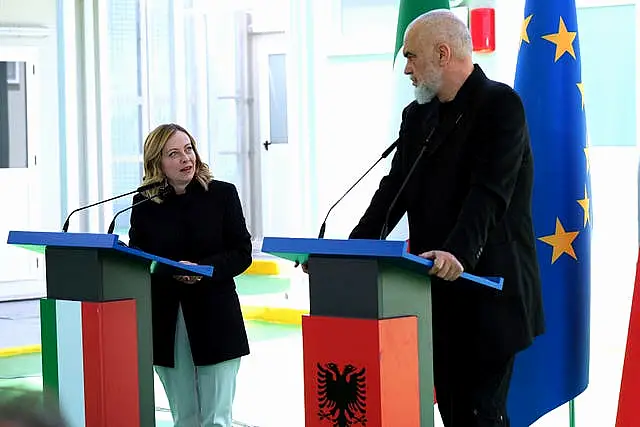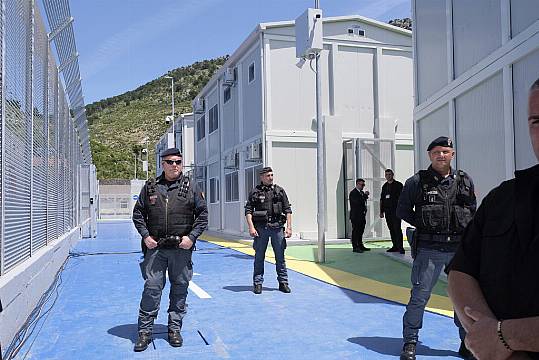Italian prime minister Giorgia Meloni visited Albania on Wednesday to thank its government for its unique role in agreeing to host thousands of asylum-seekers while Italy processes their claims, and to tour migrant centres she said will be ready in August.
Ms Meloni denied her day trip was a campaign stop on the eve of the European Parliament election, in which migration is a big issue, and said criticism of the visit was typical opposition manoeuvring.
Ms Meloni and Albania’s Prime Minister Edi Rama in November signed a five-year deal in which Albania agreed to shelter up to 3,000 migrants rescued from international waters each month while Italy processes their asylum claims.
With asylum requests expected to take about a month to process, the number of asylum-seekers sent to Albania could reach up to 36,000 in a year.

“They (Italians) are grateful to the government, they are grateful to the Albanian people for this important effort of friendship that they are making to give us a hand,” Ms Meloni told a news conference.
Albania is not a European Union member, and the idea of sending asylum seekers outside the bloc is controversial.
The deal was endorsed by European Commission President Ursula von der Leyen as an example of “out-of-the-box thinking”, but has been widely criticised by human rights groups who say that refugee protections could be compromised.
Ms Meloni has defended the “extremely innovative” plan as a necessary component of her crackdown on migration, aiming to deter would-be refugees from paying smugglers to make the dangerous Mediterranean crossing.
She said the deal has attracted the interest of 15 out of 27 EU members who are asking the European Commission if “the union (could) follow the Italian model in the agreement with Albania”.
“The most useful element of this project is that it can represent an extraordinary tool of deterrence for illegal migrants destined to reach Europe,” she said.

Ms Meloni, accompanied by interior minister Matteo Piantendosi, began her visit at Gjader, a former military airport 50 miles north of the capital, Tirana, where work on one of the two migrant centres has started.
Meloni next visited the nearby port of Shengjin, where a reception centre with housing units and offices is surrounded by a five-metre high metal fence with barbed wire on top.
She said that on August 1 both centres would be operational and ready to host the first 1,000 migrants. A regular ferry link to Italy will begin in mid-September.
Ms Meloni and her allies have long demanded European countries share more of the migration burden, and have held up the Albania agreement as an innovative solution to a problem that has vexed the EU for years.
Ms Meloni, of the Brothers of Italy party, has also championed her so-called Mattei Plan to fund projects in African countries along migrant routes in exchange for better controls.
The facilities would be fully run by Italy while it fast-tracks migrants’ asylum requests. Both centres are under Italian jurisdiction while Albanian guards will provide outside security.
Italy would welcome the migrants if they are granted international protection, or organise their deportation from Albania if refused.
Those picked up within Italy’s territorial waters, or by rescue ships operated by non-governmental organisations, would retain their right under international and EU law to apply for asylum in Italy and have their claims processed there.
Data from the Italian interior ministry shows the number of migrants arriving in Italy is down compared with the same period last year.
As of Tuesday, 21,574 people had arrived in Italy via boat so far this year, compared with 51,628 during the same period in 2023.
Mr Rama, of Albania’s governing Socialist Party, has said the deal is a sign of gratitude on behalf of Albanians who found refuge in Italy and “escaped hell and imagined a better life” after the collapse of communism in the 1990s.
“Italy has been helpful and served Albania many, many times and if we have the possibility to be helpful to Italy let’s exploit this opportunity,” said Mr Rama.







